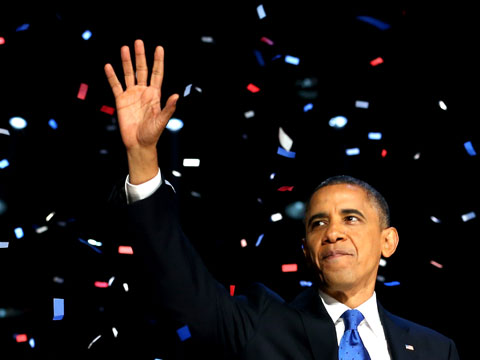Democratic Candidates Should Heed Obama’s Advice

Former President Barack Obama criticized the Democratic Party’s leftward shift. (Courtesy of Flickr)
The presidential election of 2020 is shaping up to be one of the most high-stakes elections in recent American history due in part to the stinging upset Democrats faced with the defeat of 2016 presidential nominee, Hillary Clinton.
With 2020 looming and the sea of possible contenders for the Democratic Party growing, voters undoubtably have many questions. Some questions regarding the platform of their potential candidates, while others regard what will come to define the 2020 election entirely: electability.
Former United States President Barack Obama issued a warning to Democratic hopefuls, arguing the case of electability and urging candidates to evade policies that veer “too far left.”
In a seemingly over-crowded field of Democratic hopefuls, and having suffered the presidential loss of the decade, the Democratic Party needs all the advice it can get.
Obama’s use of the phrasing “too far left” is interesting for a plethora of reasons. After all, it is not a clandestine machination of the Democratic Party to want to nominate a candidate who is capable of defeating Trump and the Republican Party. Democratic candidates are looking to find the key to this victory in 2020.
Obama’s advice to these candidates vying for control of the polls is not advice on what should be done as a Democratic hopeful per se, but is more on how a successful Democratic campaign should be executed.
With such a statement, it becomes clear that Obama is addressing the elephant in the room regarding the 2020 primaries, and that’s electability: the ultimate factor that determines why one candidate deserves to serve in the Oval Office as compared to others.
Quite candidly, instead of politically brooding over why 2016 was such an off-the-rails moment for American politics, I believe that electability as a whole should take center stage regarding the Democratic Party, and their prospects of securing a victory in 2020.
I do not believe that now is an appropriate time in American history to campaign, excitedly, vowing to potential voters to make changes that just are not that simple to make. As a result of this view, if Democrats want any hope of defeating Trump in 2020, it’s time that they adopt a more centrist approach. Democratic hopefuls should be less focused on their vision for leftist “change” in America and more focused on governing with moderation.
To elaborate on this point, the 2016 election will forever be cemented in history as one of the most polarizing elections because it was clear that neither party adopted a centrist approach.
Hillary Clinton wanted to grant amnesty to undocumented immigrants by offering a path to citizenship into the U.S., while Donald Trump wanted to build a wall to stop the flow of undocumented immigrants. To put these ideas into perspective, one could argue that Clinton veered “too far left,” and Trump veered “too far right.”
Although Trump ultimately secured the victory, many American citizens are divided on their opinion on his presidency. The reason behind this would be that neither candidate did enough to maintain a healthy balance for the country when running, and as a result of this, exacerbated the already apparent divide the country was experiencing.
If the Democrats want a victory, they cannot allow this to happen. Instead of Bernie Sanders campaigning for his famous proposal of “healthcare for all,” he should divert his attention more towards refining the health care situation already in place. That way, it becomes more difficult for people to slander Sanders as “too leftist,” or even socialist.
As a potential voter, I believe that no matter how many candidates run on the Republican Party or Democratic Party, none of it will matter if the parties cannot transcend their veerings into too far left or too far right territories.
If they cannot do this, no matter if a Democrat or Republican is elected for president in 2020, there will always be a level of disdain resonating from American citizens because the president-elect in their perspective, is emblematic of everything they voted against.
This is bound to indelibly scar many voters, and even discourage them from voting again. What is less likely to turn people away from voting is moderation. Hillary Clinton and Donald Trump were at a severe dearth in political moderation in their campaigns, and the result of this was an explosive election.
To minimize the probability of such an explosive election in 2020, Democratic candidates must take stock of their own party, and what put them in the challenging situation they now face, instead of trivially vowing to be an undeniable successor to Donald Trump as if this was an episode of “Game of Thrones.”
In fact, comments like the one above serve as a harbinger that the Democratic Party was paying no credence to Obama’s warning of being “too far left,” and that is truly a disappointment.
If Democrats want to find the path to defeating Trump in 2020, they need to stop dwelling over the burned bridges of 2016 and start looking for the tools necessary to repair them. That starts with a new repertoire of tools.
Gone should be the days where Democratic hopefuls propose a cornucopia of changes that they cannot even fulfill. Gone should be the days where a Democratic candidate’s view for America is so radically different from their Republican counterparts.
Gone should be the days where the Democratic nominee, and the Republican nominee are so polarizing that they are classified by the American people as “too left” or “too right.” And gone should be the uproar caused when a Democrat or Republican wins the election. All of this could easily be avoided if Democrats pay credence to Obama’s advice of “veering too far left.”
For the Democrats, this election season, the inspiration for change should not define a candidate’s credibility. For 2020, electability is credibility.
Noah Osborne, FCRH ’23, is a journalism major from Harlem, N.Y.







































































































































































































